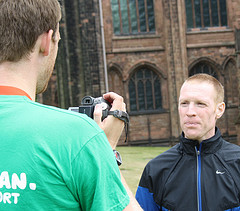Looking for an entry level job or internship in journalism? This is an overview of how to approach the search and a list of companies that might have relevant entry level and internship opportunities.
GOOD is a publication I read regularly. It’s available both as a magazine and on the web and they focus on “good” things–anything that is sustainable, prosperous, productive, creative, and just for everyone. They cover a variety of different beats from news to business to culture. One of the regular series featured on their site is The Rules which is an illustrated hilarious guide to modern etiquette. Their journalists do a great job of presenting content in a beautiful and engaging way. A Journalist is responsible for reporting on information in any number of formats (written, video, photos, illustration) across media channels.

Photo Credit: Flickr user Lichfield Live
A Journalist creates and distributes news by researching, writing, and reporting on information across mass media, including print media (newspapers and magazines), electronic media (television, radio, documentary film), and digital media (such as blogs and Twitter). To do this, Journalists cultivate sources, interview people, research, and write articles. Journalists may specialize in certain areas, such as writing regular columns on a certain topic (Columnists) or taking pictures (Photojournalists).
As a Journalist your schedule will depend on what beat you cover. A typical day for a Journalist usually involves these tasks:
The average yearly salary for a Journalist is $26,350 and $21,700 for a beginner. From there you can grow into a specialty like News Journalist ($20,000-$75,000 on average per year), Broadcast Journalist ($20,000-$97,000 on average per year), or Public Relations Specialist ($27,000-$66,000 on average per year).
These locations are some hot spots for journalists:
To be a Journalist you’ll need a bachelor’s degree, preferably in Communication, Journalism, or English. Ideally you’ll gain experience during school in writing, media and production. Try to take a broad scope of classes as well: a variety of electives such as psychology and economics are especially handy when reporting on relevant topics. Beyond that, communication is crucial; you’ll need to be able to write and speak very well. To gain experience start your own blog on a topic you’re passionate about, write for your school newspaper, and pitch specific articles to existing websites and papers.
If journalism still sounds like your cup of tea, here are a few things you should do to get started.
| Publication Manager Ohio State University Wexner Medical Center Columbus, OH | View |
| Scheduling and Planning Manager - Mission Critical Clayco Columbus, OH | View |
| Open Faculty Search Ohio State University Columbus, OH | View |
| Accounting Manager Ringside Talent Acquisition Partners Columbus, OH | View |
| Bookkeeper Creative Financial Staffing Gahanna, OH | View |
| Project Director Gilder Search Group Columbus, OH | View |
| Entry Level Accounting Associate - Hedge Fund Accounting SS&C Technologies Dublin, OH | View |
| Project Manager Clayco Columbus, OH | View |
| Open Faculty Search Westfield State University Columbus, OH | View |
| Research Scientist The Ohio State University Wexner Medical Center Columbus, OH | View |
Check out the latest job and internship postings in journalism.